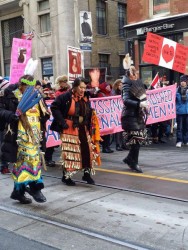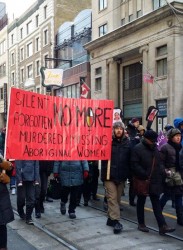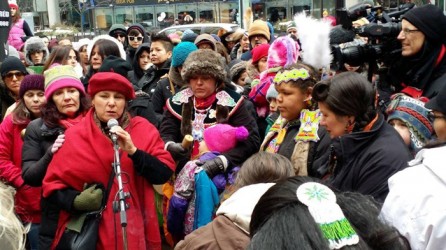Article Origin
Volume
Issue
Year
Canada’s missing and murdered Indigenous women were commemorated with a Strawberry Ceremony on Valentine’s Day.
The ceremony, held at Toronto Police Headquarters at Yonge and College streets, celebrated its tenth anniversary. More than 800 people gathered to pray, sing and remember the thousand-plus daughters, sisters, mothers and aunties whose lives were cut short by violence.
Helyna Rivera, a Mohawk woman from Six Nations, was murdered in Buffalo on Aug. 10, 2011. Last year, her killer was sentenced to 25 years by a Buffalo court.
Rivera’s grandmother, Renee Hess, addressed the crowd, promising that, “even though the grave has silenced my granddaughter’s voice, I will continue to speak for her.
“When we stand up and speak for ourselves, we are looked at as terrorists here in Canada. I refuse to be called a terrorist. I am a protector of our land and our people.”
Rivera’s mother, Linda John, wept as she spoke publicly for the first time. Holding up a picture of her daughter in her powwow regalia, she said “Three years ago, my 26-year-old daughter was murdered, shot down, gunned down by the only man she ever loved. She left four beautiful babies that I now take care of.”
The two youngest babies, she told the crowd, witnessed the murder. John said she’s learned about the violence against her daughter that took place behind closed doors and has had to rise above this for the sake of her grandchildren.
“Without the Creator by my side, I don’t think I would have gone this far,” John said. “Grab onto something, believe in something because without that power, you will be lost. There was a time when I thought my life wasn’t worth living,” she said. But when she faced her former son-in-law in court, “I looked at him and I stared and I said, ‘There will come a day when I rise above my pain, above my heart, which has been broken, shattered and then I will make an awareness and I will help’.”
Maggie Cywink from Whitefish River First Nation spoke about Sonya Nadine, her 32-year-old sister who was murdered in August 1994. Her sister went missing on Aug. 26 and, four days later, her body was found about 65 kms west of London, Ont. Her killer is still at large.
In an interview following the ceremony, Cywink said her sister was pregnant.
“My sister had 32 years in this world,” she said, “but her child had none and that’s one of the reasons I’m so frustrated.” As far as she is concerned, it was a double homicide, “but the judicial system does not see that as being a life at all,” she said.
“The big thing that really needs to change in this country,” Cywink said, “is the judicial system.” The system and the sentencing process fails the families of murdered women, she said. The perpetrators, she said, “get 10 years and then they’re in custody for eight and get two years off for good behavior and they’re out. And 10 years on a 32-year-old woman’s life, that’s nothing.”
A recent victim of violence, Roxanne Louie, member of the Okanagan Nation in BC, was remembered by her cousin, Sunshine, a hearing-impaired man who spoke through a sign language interpreter. Twenty-six-year-old Louie, a mother of a three-year-old son, went missing Jan. 4 of this year and her body was found several days later.
“She’s gone,” said Sunshine. “We know the person who was responsible is in custody, but may well be released and we’re so upset by this.” We want justice for Roxanne, he said, “It’s not acceptable. We cannot let it go on. Everyone who goes missing is missing from our families and our hearts. It has to stop!”
Organizer Audrey Huntley of Silence No More said this was the biggest gathering they’ve ever had. She estimated at least 1,000 people attended. The ceremony, led by Elder Wanda Whitebird, was followed by a march of several blocks to a feast at the YMCA prepared by the Native Men’s Residence.
- 12474 views



